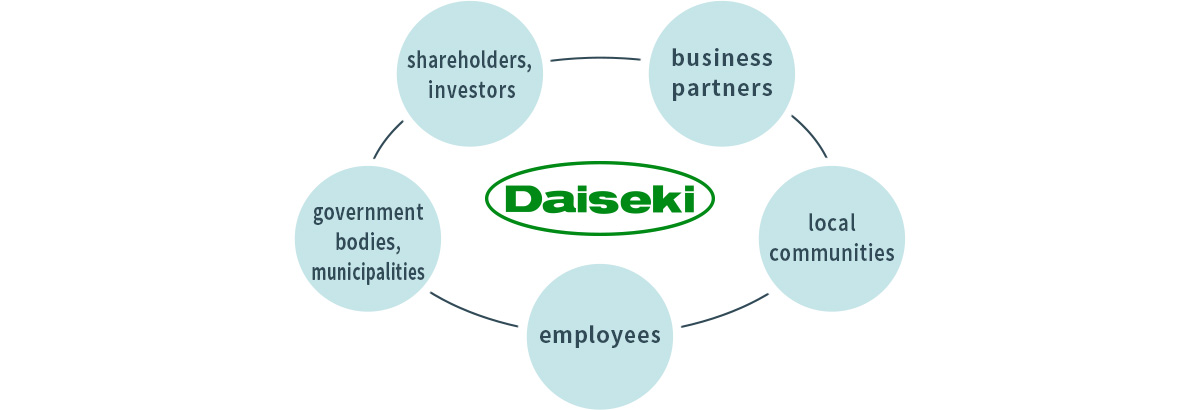| Stakeholder |
Our main responsibilities |
Major channels for engagement |
Shareholders,
Investors |
- ●Business growth (sales/profit)
- ●Return of profits to shareholders
- ●Sound and transparent management
- ●Accountability and constructive dialogue
- ●Effective corporate governance
|
- ●General Meetings of Shareholders
- ●Earnings briefings and securities reports
- ●Briefings for institutional investors
- ●Individual IR meetings: Individual informational meetings with domestic and overseas institutional investors and analysts
|
- ●Enhancement of disclosed information
- ●Timely disclosure of information related to management
|
- ●Website, Corporate Governance Report
|
- ●Proactive disclosure of financial and non-financial information
|
|
| Business Partners |
Suppliers (raw material suppliers, transport contractors)
- ●Building of a supply chain management structure with consideration of the environment, human rights, safety, etc.
|
- ●Fair and impatial transactions that consider our social responsibilities with respect to environmental conservation, resource protection, human rights, etc., based on our Purchasing and Subcontracting Management Regulations
- ●Regular supplier meetings
- ●Compliance Consultation and Reporting Desk
|
|
Users of intermediate industrial waste treatment services
- ●Building of relationships of trust through fair and impartial transactions
- ●Compliance, including alignment with the Waste Management Act
- ●Environmental conservation, promotion of carbon neutrality, and realization of a circular economy society
|
- ●Briefings by sales representatives on advantages of Daiseki's industrial waste intermediates treatment services
- ●Collaborative efforts aimed at environmental conservation
|
|
Users of recycled products
- ●Building of relationships of trust through fair and impartial transactions
- ●Stable supply of products
- ●Environmental conservation, promotion of carbon neutrality, and realization of a circular economy society
|
- ●Briefings by sales representatives on advantages of Daiseki's recycled products
- ●Collaborative efforts aimed at environmental conservation
|
|
Partner companies
- ●Environmental conservation, promotion of carbon neutrality, and realization of a circular economy society
|
- ●Technological development aimed at the reduction of environmental impacts, enhancement of our recycling rate, reduction of CO2 emissions, etc.
|
Government Bodies,
Municipalities |
- ●Compliance, including alignment with the Waste Management Act
|
- ●Proper notifications and acquisition of permissions under relevant laws and ordinances
|
●Appropriate dialogue and the maintenance of equal and sound relationships with supervisory authorities and government bodies |
- ●Implementation of meetings to exchange opinions
|
- ●Collaboration aimed at solving community issues
|
- ●Conclusion of agreements with local government bodies regarding the circular economy and environmental conservation
- ●Corporate Hometown Tax Donations program
- ●Collaborative events and initiatives
|
- ●Promotion of initiatives for carbon neutrality and a circular economy
|
- ●Proposal of policies to the government through the GX League and Circular Partners
|
| Local Communities |
- ●Solving of social and economic issues
|
- ●Participation in social contribution activities and local communities
|
- ●Contribution to regional vitalization and cooperation with communities
|
- ●Interaction with local residents through public events
|
- ●Education about the environment for future generations
- ●Regional environmental conservation
|
- ●Education for students in collaboration with universities
- ●Disaster recovery support
- ●Garbage collection and other volunteer activities
|
- ●Preservation of biodiversity
|
- ●Conservation activities carried out with local residents
|
| Employees |
- ●Provision of an environment conducive to employees' best work performance
- ●Support for job satisfaction
|
- ●Workplace environment improvement activities
- ●Employee engagement surveys
|
- ●Creation of an open workplace environment
- ●Fostering of an organizational culture that tackles innovation
|
- ●Round-table discussion between the president and other members of management to exchange views
- ●Competition of new business ideas between employees
|
- ●Fair evaluation and treatment of employees
- ●Enhancement of benefits programs
|
- ●Personal interviews
- ●Shareholding association system
|
- ●Utilization and development of human resources
|
- ●Management training
- ●Job-level-specific training
- ●Training and follow-up for new employees
|
- ●Promotion of occupational health and safety
|
- ●Risk management
- ●Implementation of safety training and drills
- ●Initiatives to reduce accident risks
|
- ●Promotion and management of people's health
|
- ●Medical checkups and health examinations
- ●Stress checks
- ●Health consultations
|
- ●Respect for human rights
|
- ●Compliance Consultation and Reporting Desk
- ●Power harassment prevention training
|
|
|













